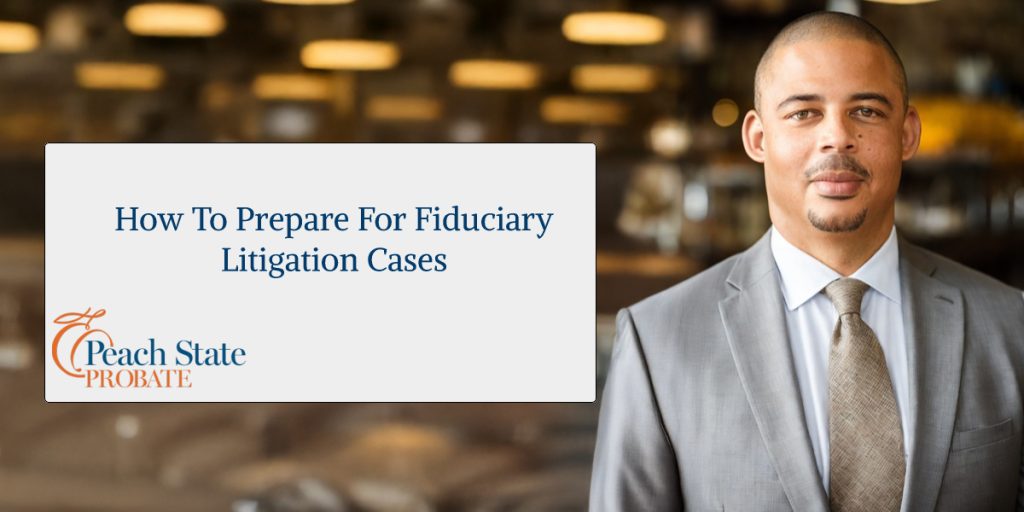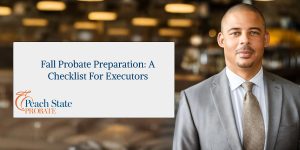## Preparing for Fiduciary Litigation: Key Strategies and Considerations
In the realm of estate and trust law, fiduciary litigation has gained increasing prominence as disputes involving fiduciaries—those entrusted with managing another person’s assets—become more common. Effective preparation for fiduciary litigation requires not only a thorough understanding of the legal framework but also strategic planning and practical steps to safeguard your interests. Whether you are a fiduciary or a beneficiary, engaging in this litigation process necessitates proactive measures to ensure the best possible outcome.
Fiduciary litigation can stem from various issues, including breaches of duty, mismanagement of funds, or conflicts of interest. As such, preparing for fiduciary litigation means recognizing the unique challenges posed by each case and developing the necessary groundwork to address them. Establishing a solid foundation is essential for navigating the complexities of these legal matters, and an informed approach lays the groundwork for successful legal proceedings.
Preparing for fiduciary litigation involves several components, including collecting documentation, engaging in thorough research, and understanding the potential implications of the case. With careful consideration and the right resources, you can empower yourself to tackle any fiduciary litigation challenges you may face.
## Defining Fiduciary Litigation: An Overview
Fiduciary litigation refers to legal disputes that arise in the context of fiduciary relationships, which are often fraught with intensity and emotional investment. Fiduciaries, such as trustees, executors, and agents, have a legal obligation to act in the best interests of those they serve. When these duties are violated, disputes can escalate to litigation, prompting extensive legal proceedings to resolve the matter.
The nature of fiduciary litigation varies widely, with cases rooted in diverse issues such as misappropriation of funds, failure to provide accurate accountings, or negligence in fulfilling the responsibilities outlined in trust documents. In Georgia, fiduciary litigation can encompass trusts, estates, guardianships, and other fiduciary duties, representing a significant area of law that impacts numerous families and individuals.
Understanding fiduciary litigation is pivotal for anyone involved in the process, as it provides clarity regarding the nuances of legal obligations and potential repercussions. Familiarity with fiduciary duties and the legal framework surrounding these relationships is crucial for effectively addressing disputes as they arise.
## The Significance of Fiduciary Litigation in Today’s Legal Landscape
Fiduciary litigation plays a critical role in estate and trust management, as it safeguards the rights and interests of beneficiaries and ensures compliance with fiduciary duties. Given the emotional and financial stakes involved, this type of litigation can have broad implications not just for the individuals directly involved, but also for the larger community affected by estate planning and fiduciary actions.
As more individuals engage in estate planning and establish trusts, the potential for disputes has increased. This trend highlights the importance of being prepared for fiduciary litigation, whether it emerges from a breach of duty or an accounting discrepancy. Georgia courts are increasingly called upon to adjudicate these cases, making it essential for individuals to understand the significance of fiduciary litigation and its impacts on their legal rights.
Moreover, fiduciary litigation often serves as a critical mechanism to hold fiduciaries accountable and protect the integrity of the trust or estate. By addressing instances of mismanagement or misconduct, courts help maintain public confidence in fiduciary roles, thereby bolstering the systems established for asset management and distribution.
## Legal Context and Framework for Fiduciary Litigation Preparation
The legal framework surrounding fiduciary litigation is multifaceted, encompassing statutes, case law, and regulations that govern fiduciary behavior. Understanding this context is essential for anyone preparing for fiduciary litigation, as it outlines the rights, responsibilities, and potential liabilities of fiduciaries.
In Georgia, fiduciaries must adhere to the duties of loyalty, prudence, and impartiality. Violations, such as self-dealing or negligence, can lead to severe legal consequences, including financial penalties and loss of fiduciary status. A thorough understanding of these obligations is vital for determining whether a fiduciary has failed in their duties and for framing an effective legal strategy.
Moreover, actual cases of fiduciary litigation provide insight into how courts interpret fiduciary duties. Familiarizing yourself with precedents and outcomes from prior cases can shape your expectations and inform your approach during the litigation process. By analyzing previously settled matters, individuals involved in fiduciary litigation can glean valuable insights about how best to prepare for their own cases.
## Illustrative Case Studies of Fiduciary Litigation
Illustrative examples of fiduciary litigation can shed light on the nuances of such disputes and offer lessons for those preparing to enter this arena. Considering real-world cases facilitates a deeper understanding of potential challenges and strategies involved in navigating fiduciary litigation effectively.
For instance, a notable case involved a trustee accused of failing to diversify investments, resulting in significant losses for the beneficiaries. The court ultimately found that the trustee had breached their duty of prudence, leading to liability for the lost funds. This case demonstrates the importance of trustees adhering to their legal obligations to protect the interests of beneficiaries.
In another case, an executor was found to have engaged in self-dealing by selling estate assets to themselves at below-market value. The court ruled against the executor, emphasizing the obligations of loyalty and the prohibition of conflicts of interest. This situation underscores the critical need for transparency and compliance with fiduciary duties to prevent disputes.
These examples highlight the spectrum of scenarios that can arise in fiduciary litigation, emphasizing the importance of diligence and adherence to legal standards for both fiduciaries and beneficiaries. Understanding these cases helps prepare individuals for the realities they may face in their own disputes.
## Practical Steps for Preparing for Fiduciary Litigation
Effective preparation for fiduciary litigation involves a series of deliberate actions designed to protect your interests and build a robust case. Engaging in detailed documentation is one of the most critical steps in this process. Maintaining accurate records of all transactions, communications, and decisions made by fiduciaries can provide essential evidence should a dispute arise.
In addition to documentation, conducting a thorough review of relevant estate planning and trust documents is crucial. Familiarizing yourself with the terms, conditions, and limitations outlined within these documents allows you to identify potential areas of conflict and strengthen your arguments. This proactive approach—including understanding the duties assigned to fiduciaries as per governing documents—can play a pivotal role in successfully navigating fiduciary litigation.
Beyond documentation and data analysis, cultivating open lines of communication with all parties involved can foster transparency and potentially mitigate disputes before they escalate. Engaging in conversations with fiduciaries and beneficiaries can help clarify expectations and address concerns proactively, creating a smoother process should litigation become necessary.
## Avoiding Common Pitfalls During Fiduciary Litigation
While preparing for fiduciary litigation, recognizing and avoiding common mistakes can make a significant difference in the outcome of a case. One of the most frequent missteps involves failing to maintain proper documentation. In the absence of clear records, it becomes challenging to substantiate claims or defend against accusations, leading to unfavorable legal consequences.
Another common error is underestimating the value of professional legal representation. Navigating the complexities of fiduciary litigation can be intricate and challenging, and attempting to handle matters independently can yield setbacks and complications. Engaging a knowledgeable attorney experienced in fiduciary litigation is crucial for guiding you through procedural requirements and legal intricacies.
Finally, emotional responses to disputes can lead individuals to make rash decisions or statements that ultimately harm their cases. Whether driven by anger, frustration, or a desire for expedience, emotional reactions can cloud judgment and lead to adverse outcomes. Remaining calm, collected, and focused on the legal objectives at hand is vital for accurately and effectively navigating fiduciary litigation.
## Recognizing When to Consult a Legal Professional
Timely legal consultation is paramount in fiduciary litigation, particularly when potential issues or disputes arise. Engaging an attorney at the onset of any fiduciary relationship can set the tone for clear expectations and reduce the likelihood of future litigation. Recognizing early warning signs—such as miscommunication or breaches of duty—serves as a cue to reach out for professional assistance.
Consulting an attorney also becomes critical when navigating complex legal documents, such as wills or trust agreements. Misinterpretations or lapses in understanding can lead to mismanagement of assets and subsequently escalate to litigation. An attorney can provide clarity on fiduciary obligations and outline strategies for compliance, aligning decisions with legal requirements.
Ultimately, legal consultation is vital not only for filing litigation but also for understanding the implications of potential claims or defenses. An attorney can empower you to make informed decisions, ensuring your rights are protected throughout the process. This proactive approach can mitigate risks and increase the likelihood of a successful resolution to the dispute.
## Advantages of Legal Representation in Fiduciary Litigation Matters
Securing legal representation during fiduciary litigation provides numerous advantages that can facilitate a smoother and more effective resolution to disputes. An attorney’s command of fiduciary law enables them to adeptly navigate the nuances of the case, guiding clients through each stage of litigation and developing strategies tailored to their unique circumstances.
Furthermore, having legal advocates offering emotional and practical support can be invaluable. Fiduciary litigation often involves sensitive personal matters, and having representation ensures clients have a trusted ally who addresses their concerns and advocates for their rights.
In addition to emotional support, attorneys bring negotiation and communication skills to the table, which can lead to favorable settlements before trial. An attorney’s ability to articulate legal arguments clearly can persuade other parties involved to resolve disputes amicably, saving both time and expenses associated with prolonged litigation.
## How Peach State Probate Supports Clients in Fiduciary Litigation
Peach State Probate stands out as a premier choice for individuals facing fiduciary litigation in Georgia. Our team of dedicated legal professionals understands the intricacies of fiduciary relationships and the challenges clients encounter when disputes arise. We emphasize a client-centered approach that prioritizes your objectives and concerns.
Whether working with fiduciaries or beneficiaries, Peach State Probate aims to guide clients through the challenges of fiduciary litigation with skill and professionalism. Our team utilizes in-depth legal knowledge and practical strategies to address issues related to breaches of fiduciary duty and ensure that clients’ rights are upheld throughout the litigation process.
Moreover, we pride ourselves on open and transparent communication, ensuring that clients are informed and empowered every step of the way. By combining our passion for effective advocacy with a deep understanding of fiduciary law, Peach State Probate is well-equipped to support clients in navigating fiduciary litigation cases, achieving favorable outcomes on their behalf.




